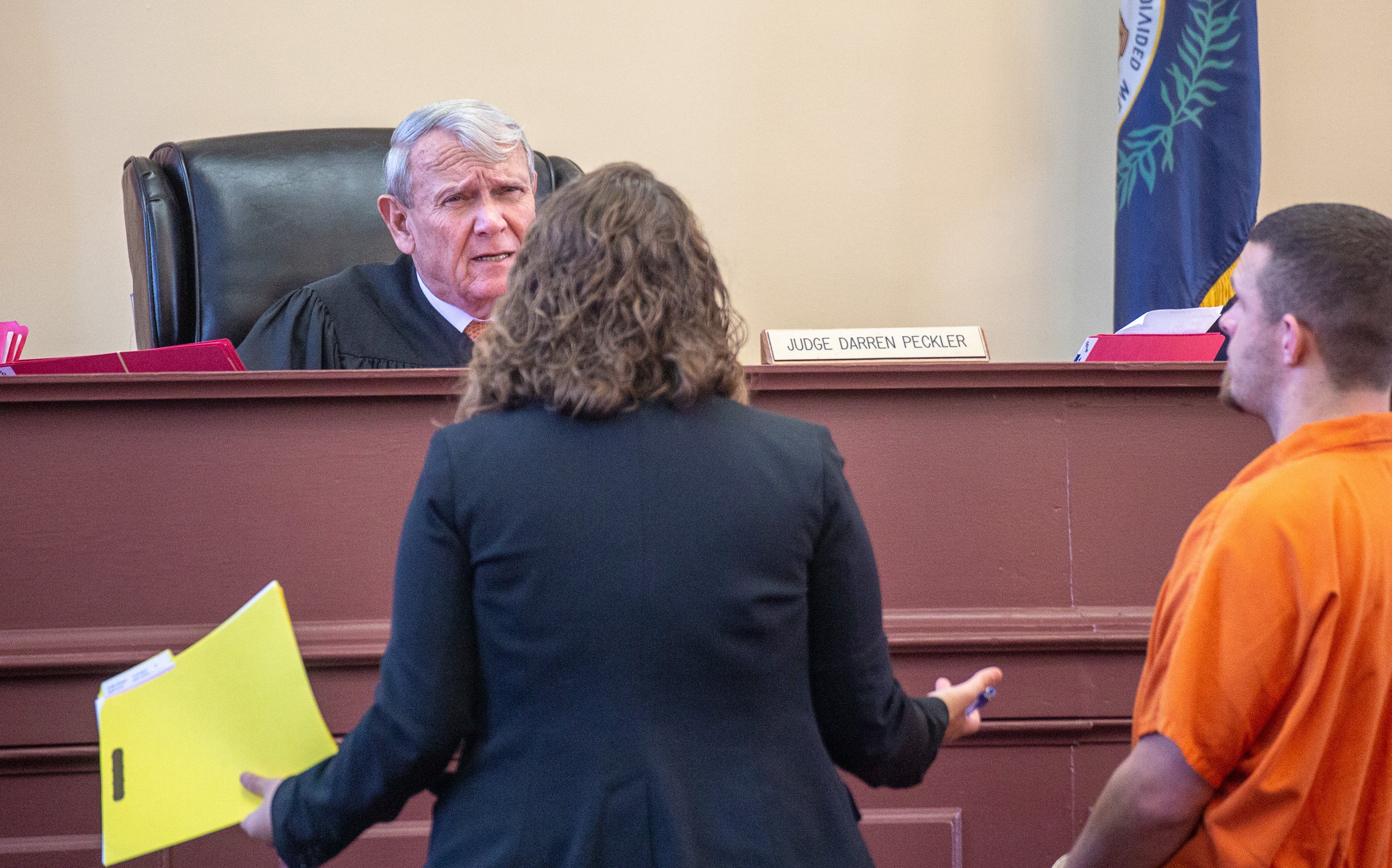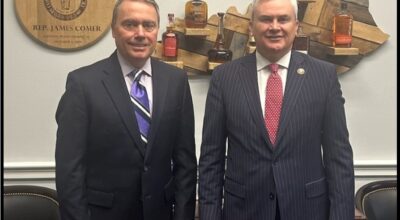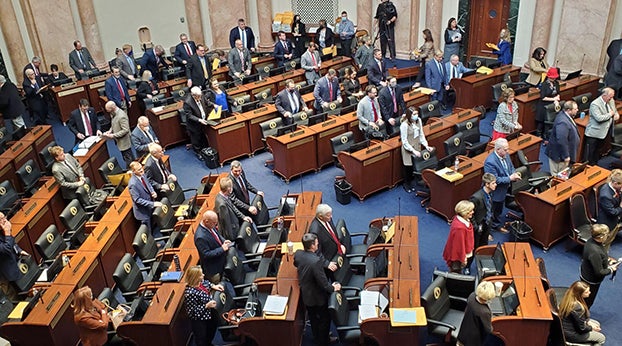In Focus: Appeal takes aim at financial bonds in Boyle
Published 7:22 pm Friday, August 23, 2019

- Circuit Court Judge Darren Peckler, facing camera, discusses a case with public defender Jessica Buck, center, during a court date in October 2018. (File photo by Ben Kleppinger)
Danville’s lead public defense attorney has taken a fight over financial bonds to the Kentucky Court of Appeals. It’s a case that could have implications for how defendants’ bonds are set in Boyle and Mercer counties and throughout Kentucky if the Court of Appeals decides to publish an opinion.
Jessica Buck, directing attorney for the Department of Public Advocacy’s Danville office, appealed a $10,000 cash bond set by Circuit Court Judge Darren Peckler for one of her indigent clients on Aug. 1. She argues Peckler based the bond on “factually erroneous information;” and violated her client’s state and federal constitutional rights.
She also argues Peckler violated rules set by the Kentucky Supreme Court, requiring judges to “devote adequate time to judicial duties” and avoid delays in case processing.
The case of her client, Stacy Devine, is representative of a “widespread and systematic problem” in Peckler’s 50th Circuit Court concerning financial bonds, Buck’s appeal alleges.
The same day Buck appealed, Peckler amended Devine’s bond to let her out if she could pay $500. Devine was able to pay the reduced amount and got out of jail on bond Aug. 2. That development led the Kentucky Attorney General’s Office to ask the Court of Appeals to dismiss the case.
The Court of Appeals has not yet ruled one way or the other; Buck is asking the court to hear the case anyway, because she alleges a ruling would help resolve problems with cash bonds that have plagued Boyle and Mercer defendants more often than defendants in many other areas of the state.
In 2018, Boyle County defendants were allowed to leave jail without paying money about 14 percent of the time, according to data from the Administrative Office of the Courts. In Mercer County, the number was 17 percent. Peckler’s 50th Circuit Court and Judge Jeff Dotson’s 50th District Court serve both counties. Statewide, defendants could get out of jail without paying about 40 percent of the time, and there were 20 counties where non-financial bond rates exceeded 50 percent, according to the data.
For years before 2018, Boyle and Mercer counties had the lowest rates of non-financial bonds in the state, hovering in the single digits. In 2018, Boyle had the third-lowest rate and Mercer was tied for eighth-lowest.
Statewide, financial bonds hold many poor people in jail who might otherwise qualify for release. There were 64,123 defendants in Kentucky in 2016 facing non-violent, non-sexual charges who were being held in jail because they couldn’t afford their bonds, according to research by the Pegasus Institute, a non-partisan think tank.
In her appeal of Peckler’s bond, Buck said Devine is entitled to be out of jail without paying money, given the low likelihood that Devine will reoffend or fail to appear for a court date.
“I started out filing the appeal in order to get my client released from custody. That was the sole goal in filing any appeal,” she said. “Now that she is out of custody, she is still out $500 that we believe the law does not require to have posted, so we’d like her money back.”
Buck acknowledged the larger problem she sees with financial bonds from Peckler’s court could also be addressed if she is successful in getting the Court of Appeals to rule, but said that’s not why she filed the appeal.
“I represent an individual client, not a cause,” she said. “But if this helps in the future, we would welcome that.”
Buck said it’s “hard to say” how common it is to appeal bonds set by judges in Kentucky. This is the second time Buck has appealed a bond since she’s been a public defender in Danville. The Court of Appeals affirmed Judge Peckler’s bond decision in the other appeal from 2018.
“In some jurisdictions, (bond appeals) are more common than others,” she said. “Here, our office has been focusing on bail litigation. We think the statistics show, and the jail study shows, our clients are being held disproportionately on financial bonds.”
Peckler was not available to comment on Buck’s appeal for this report. At about 2:30 p.m. Thursday, an assistant in his Boyle County office said he had left for the day and would not be returning until Monday for a trial. A follow-up phone call Friday confirmed Peckler was not available to comment and could not be reached by his office. Peckler has not responded to requests for comment or declined to comment for numerous previous reports by The Advocate-Messenger on financial bonds.
The Court of Appeals has no specific deadline by which it must dismiss or hear the appeal.
Devine’s case
Devine was arrested Feb. 8 on charges of drug possession, tampering with physical evidence and first-degree promoting contraband. According to her arrest citation, she was a passenger in a vehicle stopped for minor traffic violations.
A Boyle County deputy allegedly found needles and marijuana on her during the stop; when she was being booked into the Boyle County Detention Center, jail staff found methamphetamine on her person and she attempted to eat some more methamphetamine that had been concealed in her waistband, according to the citation.
Devine was given a cash bond by District Court Judge Jeff Dotson, meaning she would have to pay money to leave jail while her case was pending. But Dotson also gave Devine bail credit of $100 a day, a common practice in Dotson’s courtroom. On Feb. 19, Devine was able to leave jail using the bail credit she had earned.
In April, a Boyle County grand jury indicted Devine, meaning the case against her would proceed in Peckler’s circuit courtroom, which handles felony cases. Devine was indicted for promoting contraband and possession of drug paraphernalia — but also for first-degree drug trafficking for allegedly “possessing with the intent to traffic in two or more grams of methamphetamine.”
Peckler revoked Devine’s district-court bond and issued an arrest warrant, setting a new bond of $10,000 cash — an amount Peckler routinely sets for defendants facing felony drug charges.
Almost three months later, Devine was arrested July 14 on the new warrant.
Seeking a lower bond
In written findings issued the day after Devine was re-jailed, Peckler kept the $10,000 cash bond in place because “the defendant is found by the court to present a flight risk/be unlikely to appear for trial.”
Peckler’s findings allege Devine had a prior misdemeanor, had a new case brought against her while this case was pending, was currently on probation, had prior substance abuse issues and had served time in jail previously.
Buck filed a motion for emergency review of bail the next day, claiming much of what Peckler put in his findings was “erroneous” and asking for a non-financial bond.
“The pre-trial risk assessment shows, contrary to the court’s findings, that Ms. Devine was not arrested for a new crime while charges were pending,” according to the motion. “The pre-trial risk assessment also shows … that Ms. Devine has never been sentenced to a period of incarceration. And while Ms. Devine is on probation, it is an unsupervised probation for a misdemeanor shoplifting case.”
Buck’s motion also pointed out Devine does not have any previous drug charges on her record, and that she had appeared for a previous court date concerning the charges against her. Devine’s pretrial risk assessment found she had a “moderate” risk of failing to appear and a “low” risk of committing any new criminal activity while out on bond, according to the motion.
Buck’s motion argued Devine is entitled to a non-financial bond under the state’s rules of criminal procedures. If Devine remained “illegally incarcerated … she will suffer irreparable harm including, but not limited to losing her employment,” the motion stated.
Peckler did not issue a ruling on Buck’s motion for more than two weeks. On Aug. 1, Buck appealed to the Court of Appeals; that same day, Peckler ruled on the emergency review motion and reduced Devine’s bond.
Buck alleges in one of her filings with the Court of Appeals that Peckler’s ruling came “perhaps as a response to the filing of this appeal.” She also alleges the delayed response was due to Peckler taking a 17-day vacation without designating another judge to handle emergencies in his absence.
The appeal
Buck’s bond appeal to the Court of Appeals makes many of the same claims from her motion for emergency review of bail. It asks the Court of Appeals to hear oral arguments, which isn’t common for cases like this; and to publish its decision, creating a precedent for future cases.
“A published opinion would provide much needed guidance in an area in which there exists a paucity of authority,” the appeal states.
The appeal alleges Peckler violated the 14th Amendment’s Equal Protection Clause and excessive bail clauses found in the federal and state constitutions by refusing to give Devine bail credit. It cites a recent appeals court ruling from Texas that described a problem with financial bonds: “(P)oor arrestees … are incarcerated where similarly situated wealthy arrestees are not, solely because the indigent cannot afford to pay a secured bond.”
And the appeal alleges Peckler’s circuit court “has failed to comply with the duties required of it under the rules of the Supreme Court.”
“Ms. Devine has been incarcerated since July 14, 2019 and still has not gone before a judge,” the Aug. 1 appeal states. “It is presumed that her first court date will (be) August 12, 2019; however, she does not yet have a court date assigned. Thus, if this court does not grant her relief, Ms. Devine will have spent thirty days incarcerated before she ever sees a judge.
“… Ms. Devine remains in custody based upon factually erroneous evidence. Each day that Ms. Devine spends illegally incarcerated costs Boyle County $30 (approximate cost per inmate per day at the Boyle jail). By failing to hold in-custody arraignment court more often than once a month, the circuit court is denying defendants their right to be heard without unreasonable delay and is causing the county to incur unnecessary costs.”
Buck’s appeal cites Supreme Court rules that require judges who work in single-judge circuits such as Peckler’s to make arrangements for a special judge to handle “urgent matters” if the regular judge is “leaving the circuit .. for an extended period.”
“In the current case the circuit court (judge) left the jurisdiction for approximately 17 days without having any other judge designated to dispose of urgent matters, such as the defendant’s motion for emergency review of bail,” the appeal alleges.
Buck closes her five-page appeal by pointing to data from the Administrative Office of the Courts and a recent criminal justice system study conducted by Boyle and Mercer counties showing Peckler’s court “has one of the lowest non-financial pretrial release rates in the state” and “some of the lowest case-processing speeds in the state.”
“The failure of this trial court to follow (state law concerning pretrial release) is a widespread and systematic problem, with Ms. Devine being only one of many defendants who are not granted release,” the appeal states.
Is it moot?
On Aug. 12, Assistant Attorney General Ken Riggs filed a response to Buck’s appeal, arguing the Court of Appeals should dismiss the case because Devine is now out of jail after paying $500.
Riggs wrote that Buck’s “recitation of the underlying facts in her brief appear to be accurate.” But because Peckler did ultimately rule on the emergency motion and Devine was able to afford the new, lower bond, “there remains no justiciable issue.”
Anticipating a further response from Buck, Riggs argued against certain exceptions that would prevent the case from being dismissed for mootness.
One exception would be if the appellant — Devine — could “be subject to the same alleged problem again.” Riggs argued there is no proof that could be the case.
Riggs also argued against a second exception for “public interest,” which “allows a court to consider an otherwise moot case when (1) the question presented is of a public nature; (2) there is a need for an authoritative determination for the future guidance of public officers; and (3) there is a likelihood of future recurrence of the question.”
“Every bond decision is unique and relies on the very specific nature of the defendant and the crimes,” Riggs argued. “Proper mechanisms exist in Kentucky for fair resolution of such matters while affording the defendants a full measure of due process.”
Arguing against mootness
Typically, Buck would not be allowed to respond further — the Court of Appeals considers just the original appeal and the AG’s response. But Buck filed a motion Aug. 14 asking the court to accept an additional response from her or strike the AG’s response from the record.
“That Ms. Devine was able to scrape together $500 after being detained illegally … for 20 days does not render this appeal moot,” Buck argued in her additional reply brief. “Although the circuit court has lowered (Devine’s) bond to a lower cash amount, her bond is still set in violation” of state laws that entitle her to a non-financial bond.
“Until (Devine’s) money is returned to her and she is given a non-financial bond, she is suffering from an actual injury, which would be redressed by a favorable judicial decision. Therefore, Ms. Devine’s appeal is not moot,” Buck wrote.
Buck also argued the “public interest” exception does apply because Devine’s case is not unique in Peckler’s court.
“The circuit court in the instant case arrests or re-arrests every single defendant from whom an indictment is issued by the grand jury. Every single individual is initially given a cash bond, regardless of individualized circumstances,” Buck wrote. “Further, the circuit court routinely leaves the office without delegating anyone to have signature authority in his absence. His 17-day vacation which prevented him from hearing (Devine’s) emergency motion in a timely manner is the second such instant in the last six months.”
A footnote in Buck’s reply claims Peckler also failed to make arrangements for an emergency judge when he underwent back surgery in April.
“Further, the circuit court often makes itself unavailable during the last two weeks of each month when there are no routine motion hours or hearing dates,” Buck’s reply continued. “This practice has occurred within the 50th Judicial Circuit for many years and there is no reason to believe it will stop anytime in the future.
“Therefore, month after month, defendants are placed in the same situation as (Devine). This is an issue that will re-occur unless and until a high court renders an opinion.”






